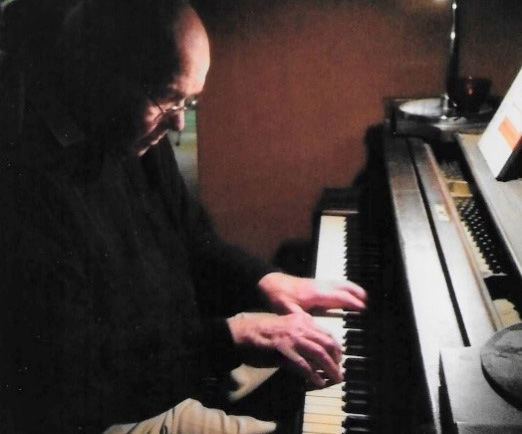Paul Moore: The harmony of heaven, when we all will be in perfect pitch

The late Jerry Klein, former Catholic Post columnist, at the piano. (Provided photo)
In My Father’s House / By Paul Thomas Moore
My predecessor in this column space, my late father-in-law Jerry Klein, wrote not infrequently on these pages of his mind’s happy wanderings on the subject of heaven, “If God’s earth can be so beautiful, what must heaven be like?”
There are many opinions of what heaven might be like. The Catechism of the Catholic Church has a perhaps surprisingly concise definition: heaven is God’s “place,” and the place of the saints and angels who surround him.
When I opened my catechism to look up “heaven,” hidden between the pages I happened upon the last photo of my own mother, Teresa, taken during her final illness in the hospital. At one point she had lifted her head up a little from the pillow, opened her eyes and said, “This is only temporary.” Almost as quickly she was back asleep.
Our daughter said, “Daddy, she doesn’t know what she’s saying.”
I think Mom was saying life is temporary, heaven eternal.
PERSPECTIVES OF HEAVEN
The “Catholic Dictionary” by the late Father John Hardon, SJ, who taught at the Jesuit School of Theology at Loyola University in Chicago, states that in heaven “depth of beatitude will depend on the measure of God’s grace with which a person dies.” In other words, the same God will be beheld by all justified by faith, but the more one has lived on earth as if already a citizen of heaven, the greater one’s capacity to appreciate the immeasurable joys of residence once onsite.
Among the many perspectives of heaven, I am drawn to the words of St. Elizabeth Ann Seton, founder of the American Sisters of Charity and the first American-born saint, who taught us that to begin to usher in the immortal life of Heaven, all we need to do is “whisper his name of love. . . . again and again repeat it — Jesus, Jesus, Jesus, Jesus, Jesus.”
Mother Seton also referred to the “harmony of heaven.” I think Bradley University music graduate (1950) Jerry Klein would have agreed, and the following excerpt from one of his columns is particularly pleasant to contemplate on a midwinter’s day:
“I like to think that it is always a May morning in heaven . . . and off there somewhere the faint echo of those old Marian songs . . . ‘On this day, oh beautiful Mother.’”
“A JOY FOREVER”
The Oxford Dictionary describes harmony as “a state of peaceful existence and agreement,” or musically, “the way in which different notes that are played or sung together combine to make a pleasing sound.”
I had the privilege of singing with the St. Mary of Lourdes Parish choir on Christmas weekend, and one of the pieces was an arrangement of “Night of Silence” sung in harmony with “Silent Night.” I had tried to stick to the melody of “Silent Night” and not be pulled into the harmony part. Afterwards, my wife congratulated me on my singing of the harmony.
Fact is, when two complementary tunes are sung together, it doesn’t really matter which is harmony and which is main melody: together they carry the impression of harmony, just as complementary notes played together create a chord — which comes from the word “accord” (from the Latin accordare, meaning “to be of one heart.”)
A beautiful soul is in harmony with God and belongs with him forever. A beautiful song or painting brings joy on earth long after its maker has gone to God, but a beautiful soul does double-duty, bringing joy to heaven while leaving a bequest of love here on earth. As the poet John Keats wrote, “A thing of beauty is a joy forever.” How much more beautiful a soul?
I expect that harmony is one of the hallmarks of heaven — that purified souls, whether through earthly application or purgatorial refining, and while singing the different (but complementary) parts assigned to each by the Great Conductor — are all on key, in perfect pitch, and in effortless harmony.
Yes, this does involve some tuning and pruning of the discordant elements of our nature, which can and does take a lifetime. But as Servant of God Dorothy Day wrote, “Patience . . . is spiritual work.”
Along our road to heaven, we might as well whistle while we work. God will do the harmony part.
—
 PAUL THOMAS MOORE is a Catholic commentator and singer-songwriter. He and wife Mary Louise attend St. Mary of Lourdes Parish in Germantown Hills. He can be reached at paulthomasmoore@hotmail.com.
PAUL THOMAS MOORE is a Catholic commentator and singer-songwriter. He and wife Mary Louise attend St. Mary of Lourdes Parish in Germantown Hills. He can be reached at paulthomasmoore@hotmail.com.





